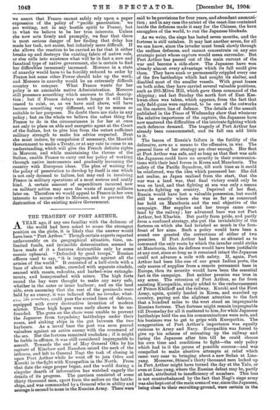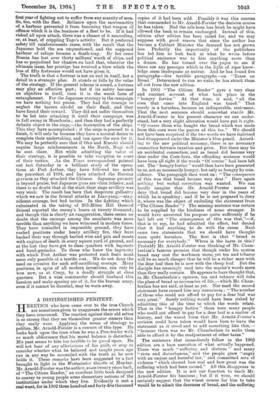e ve,. n.eni hers, could pass the serried lines of defence,
equipped with every destructive' invention of modern science. These high hopes were early shown to be un- founded. The from on the shore were unable to prevent the Japanese from torpedoing battleships under their noses, and sinking ships in the gut between the two harbours. As a naval base the port was soon proved valueless against an active enemy with the command of the sea. But the fortress remained unshaken; if it might be feeble in offence, it was still considered impregnable to assault. Towards the end of May General Oku by his capture of Kinchow and Nanshan seized the neck of the isthmus, and left to General Nogi the task of closing in Upon Port Arthur while he went off to join Odzu and Kuroki in the fight with Kuropatkin in the North. From that date the siege proper began, and the world during a singular dearth of information has watched 'eagerly the details of its progress. The garrison consisted of some thirty thousand men, apart from the sailors on the battle- ships, and was commanded by a General who in ability and courage is second to none in the Russian Army. There were said to be provisions for four years, and abundant ammuni-' tion ; and in any case the extent of the coast-line contained inside the defences made it easy for the Chinese, the born smugglers of the world, to run the Japanese blockade.
As we write, the siege has lasted seven months, and the fortress is still untaken. It may last another seven, for all we can know, since the invader must break slowly through the endless defences, and cannot concentrate on any one strategic point whose capture would mean surrender. But Port Arthur has passed out of the main current of the war and become a side-show. The Japanese have won already almost every advantage which its fall could give them. They have sunk or permanently crippled every one of the five battleships which had sought its shelter, and disabled most of the smaller vessels. With great losses on both sides, they have carried several valuable positions, such as 203-Metre Hill, which gave them command of the shipping ; and last Sunday the north fort of East Kee- kwan-shan was taken, which appears, from the fact that only field-guns were captured, to be one of the outworks on the eastern line of defence. The details of the assault published in the Times of Wednesday show that whatever the relative importance of the capture, the Japanese have now mastered the difficulties of the intricate fighting which such defences demand. The tragedy of Port Arthur has already been consummated, and its fall can add little to it.
The lesson of Russia's failure is the futility of the defensive, save as a means to the offensive, in war. The general lines of her strategy are clear enough. Her fleet at Port Arthur was safe, and so long as that fleet was safe the Japanese could have no security in their communica- tions with their laid forces in Korea and Manchuria. The safety of the Pacific Squadron, till such time as it could be reinforced, was the idea which possessed her. She did not realise, as Japan realised from the start, that the war was a land war, that final victory could only be won on land, and that fighting at sea was only a means towards fighting up country. Deprived of her fleet, Russia would have lost a valuable possession, but would still be exactly where she was so far as concerned her hold on Manchuria and the real objective of the campaign. Her supplies and her troops came over- land by the railway ; her advanced base was not Port Arthur, but Kharbin. But partly from pride, and partly from a confused strategy, she put the inviolability of the fortress on which she had lavished so much in the fore- front of her aims. Such a policy would have been a sound one granted the correctness of either of two premises. If Port Arthur had been so situated as to command the only route by which the invader could strike at Manchuria, then its defence would have been justifiable at any cost, since so long as it remained intact the Japanese could not advance a mile with safety. If, again, Port Arthur had been like one of our great Indian ports, the only source of supplies from a remote permanent base in Europe, then its security would have been the essential fact in the campaign. But neither premise was true in any sense. The retention of Port Arthur, so far from assisting Kuropatkin, simply added to the embarrassment of Prince Khilkoff and the railway. Kuroki and the First Army, again, quietly landed in Korea, and marched up country, paying not the slightest attention to the fact that a hundred miles to the west stood an impregnable Russian fortress. That fortress might remain impregnable till Doomsday for all it mattered to him, for while Japanese battleships held the sea his communications were safe, and his business was to get to grips with Kuropatkin. The exaggeration of Port Arthur's importance was equally ruinous to Army and Navy. Kuropatkin was forced to give up his scheme of retreating up the railway and luring the Japanese after him till he could choose his own time and conditions to fight—the only policy which had in it the germs of possible success—and was compelled to make abortive attempts at relief which came very near to bringing about a new Sedan at Liao- yang. Moreover, Stoners thirty thousand men locked up in Port Arthur might have turned the day at the Yalu, or even at Liao-yang, where the Russian defeat may be, partly at least, attributed to insufficiency of numbers. This loss is not counterbalanced by the fact that Nogi's siege army was also kept out of the main arena of war, since the Japanese, being close to their recruiting-ground, were certain in the first year of fighting not to suffer from any scarcity of men. So, too, with the fleet. Reliance upon the sacrosanctity of a harbour prevented it from becoming that weapon of offence which it is the business of a fleet to be. If it had risked all upon attack, there was a chance of it succeeding, or, at least, of crippling Togo's activity. But it preferred safety till reinforcements came, with the result that the Japanese held the sea unquestioned, and the supposed harbour of refuge became a, death-trap. By her error Russia has lost over thirty millions' worth of ships, and has so prejudiced her chances on land that, whatever the ultimate issue, her prestige has received a blow which the loss of fifty fortresses would not have given it. The truth is that a fortress is not an end in itself, but a detail in a strategic plan. It stands or falls by the value of the strategy. If the general scheme is sound, a fortress may play an effective part ; but if its safety becomes n' an objective in itself, then it is the worst form of entanglement. For the Japanese strategy in the campaign we have nothing but praise. They had the courage to neglect the barren citadel on their flank, and they have found their reward. They did not suffer themselves to be led into attacking it until their campaign was in full swine. in Manchuria ; and then they had a perfectly definite object in the siege,—the destruction of the ships. This they have accomplished ; if the siege is pressed to a finish, it will only be because they have a natural desire to complete their undertaking, and can spare the men for it. We may be perfectly sure that if Oku and Kuroki should require large reinforcements in the North, Nogi will be sent there. But while admitting the value of their strategy, it is possible to take exception to some of their tactics. As the Times correspondent pointed out last Saturday in a brilliant study of the opera- tions at Port Arthur, they have followed too much the precedent of 1894, and have attacked the Russian garrison as they attacked the Chinese. Japanese gunnery is beyond praise, but Japanese guns are often inferior, and there is no doubt that at the start their siege artillery was very weak. The result has been that desperate gallantry which we saw in the frontal attacks at Liao-yang,—mag- nificent courage, but bad tactics. In the fighting which culminated in the taking of 203-Metre Hill General Stiissel reported the enemy's losses at twenty thousand; and though this is clearly an exaggeration, there seems no doubt that the carnage among the assailants was more terrible than anything we have witnessed in modern times. They have tunnelled in impossible ground, they have rushed positions under heavy artillery fire, they have hacked their way through barbed wire and pits and moats with engines of death in every square yard of ground, and at the last they have got to close quarters with bayonets and hand-grenades. To those who know the ingenuity with which Port Arthur was protected such feats must seem only possible at a terrific cost. We do not deny the need on occasion for such self-sacrificing courage. Many positions, in spite of all modern inventions, can only be won now, as at Crecy, by a deadly struggle at close quarters. But a wise commander should husband this heroism and make sparing use of it, for the bravest army, even if it cannot be daunted, may be worn away.
A DISTINGUISHED PENITENT.



































 Previous page
Previous page